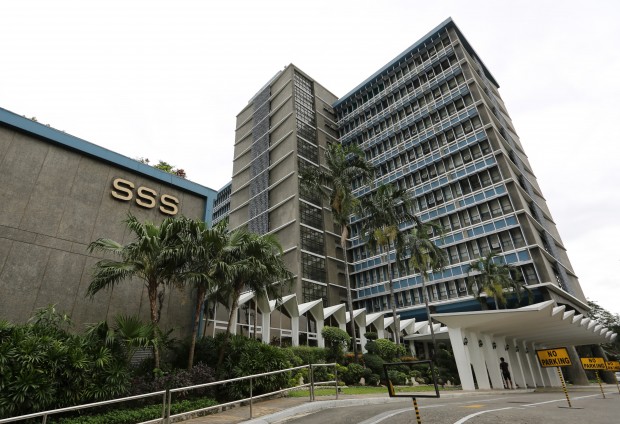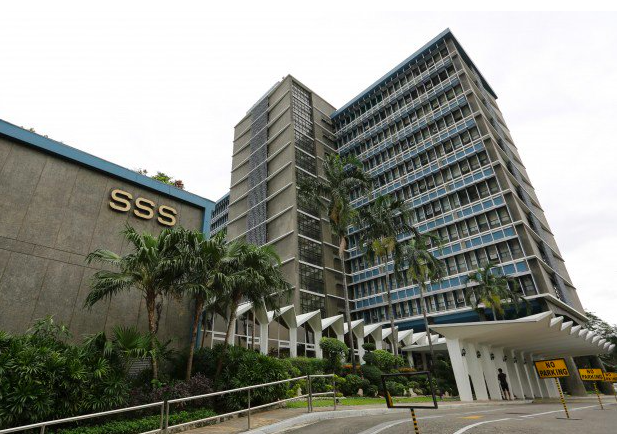
The Social Security System (SSS) Building on East Avenue, Quezon City. INQUIRER file photo / RAFFY LERMA
The Supreme Court has quashed a provision in the Social Security Act that disqualified individuals from receiving a survivorship pension if they became legitimate spouses only after the pensioners they married had suffered permanent disability.
In a 15-page decision promulgated on Oct. 24, 2023, the court ordered the Social Security System (SSS) to process the benefit claims of petitioner Belinda Dolera, who had requested to receive the survivorship pension as a primary beneficiary after her husband died in 2009.
No amounts were mentioned in the ruling made public by the court only on Thursday last week.
The court acknowledged that Congress crafted the law in a way that would avoid social security benefits from going to wives or husbands in sham marriages.
But it said that the provision applied to Dolera was “too sweeping” and “arbitrary” because it considered that all marriages after a pensioner became disabled as a sham, regardless of the circumstances.
‘Dangerous presumption’
“The presumption is dangerous as it assumes a fact which is not necessarily true,” the Supreme Court said. “This amounts to a deprivation of property without being afforded the opportunity to be heard.” Dolera and her husband, Leonard, a member-pensioner of the SSS during his lifetime, lived as common-law spouses and had a child in 1979.
Leonardo became disabled on May 22, 1980, and began receiving his permanent total disability pension from the SSS.
They got married on Oct. 13, 1981, and lived together for 28 years until Leonardo’s death.
As the surviving spouse, Dolera filed a claim for survivorship pension with the SSS. The SSS denied her claim in a notice to her on April 5, 2011. It said that she could not be considered a primary beneficiary under Republic Act No. 8282, or the Social Security Act of 1997, because she only became a legitimate spouse after he suffered total disability.
It cited Section 13 of the Social Security Act which states that “[u]pon the death of the permanent total disability pensioner, his [or her] primary beneficiaries as of the date of disability shall be entitled to receive the monthly pension.”
Dolera appealed to the Social Security Commission and later to the Court of Appeals. Both denied her pension claim, prompting her to raise the issue to the high tribunal.
2005 case
In granting her petition, the Supreme Court cited the 2005 case of Dycaico vs SSS which had similar or parallel circumstances and where it also sided with the petitioner.
Elena Dycaico was also claiming a survivorship pension following the death of her husband, Bonifacio, who was receiving retirement pension.
Bonifacio declared Elena and their eight children as beneficiaries and at the time, the couple were living together as husband and wife but were not married. Bonifacio retired in 1989 and started receiving his monthly SSS pension until he died in 1997. But a few months before his death, Bonifacio married Elena.
The SSS denied Elena’s survivorship claim and ruled that she was not considered a primary beneficiary of Bonifacio because they got married only after his retirement.
Elena brought her case to the Supreme Court, which ruled in favor of her and struck down the provision “as of the date of his retirement” in Section 12-B(d) of the social security law.
Just like in Dolera’s case, the high court said it infringed the equal protection clause of the Constitution.
The high court ruled that the two classifications of dependent spouses in the social security policy—those who married retired SSS members and those who married permanently disabled pensioners—were “vague and flimsy.”
The provision “as of the date of disability” in Section 13-A(c) of RA 8282 applied to Dolera’s case, the Supreme Court said.
Discrimination
The court pointed out that the two provisions “discriminate” against these two groups of dependent spouses.
In the Dycaico case, the high court noted the Congress’ concern about the possibility of “relationships entered for the purpose of obtaining benefits from the SSS member or pensioner.”
“In essence, what the Congress sought to avoid in enacting the social security law was only the granting of benefits in favor of surviving spouses whose respective marriages to the deceased pensioners were a sham,” it said.
However, classifying the dependent spouses using the qualifying phrases concerning date of disability was “unreasonable and not necessarily an effective means to achieve the social security law’s policy objective of preventing sham marriages.”
Undue prejudice
“On the contrary, it creates undue prejudice and discrimination against dependent spouses who did not contract their respective marriages to their pensioner-spouses for the purpose of obtaining benefits and who would otherwise be entitled to the survivorship pension if not for the unreasonable classification,” the court said.
The Supreme Court pointed to the fact that Dolera and her deceased husband, Leonardo, already had a child prior to the disability, they lived exclusively as husband and wife, and their union lasted for 28 years, proving that their marriage “was by no means a sham.”
The court said that Belinda’s marriage to Leonardo “cannot be considered as a scheme that she employed merely to enable her to qualify for survivorship pension. To be sure, it was one that was entered into without any semblance of bad faith.”
RELATED STORIES
Bongbong Marcos commits to improving SSS services
UP professor arrested for ‘violating’ SSS law
COA: SSS failed to collect P92B in 2022
